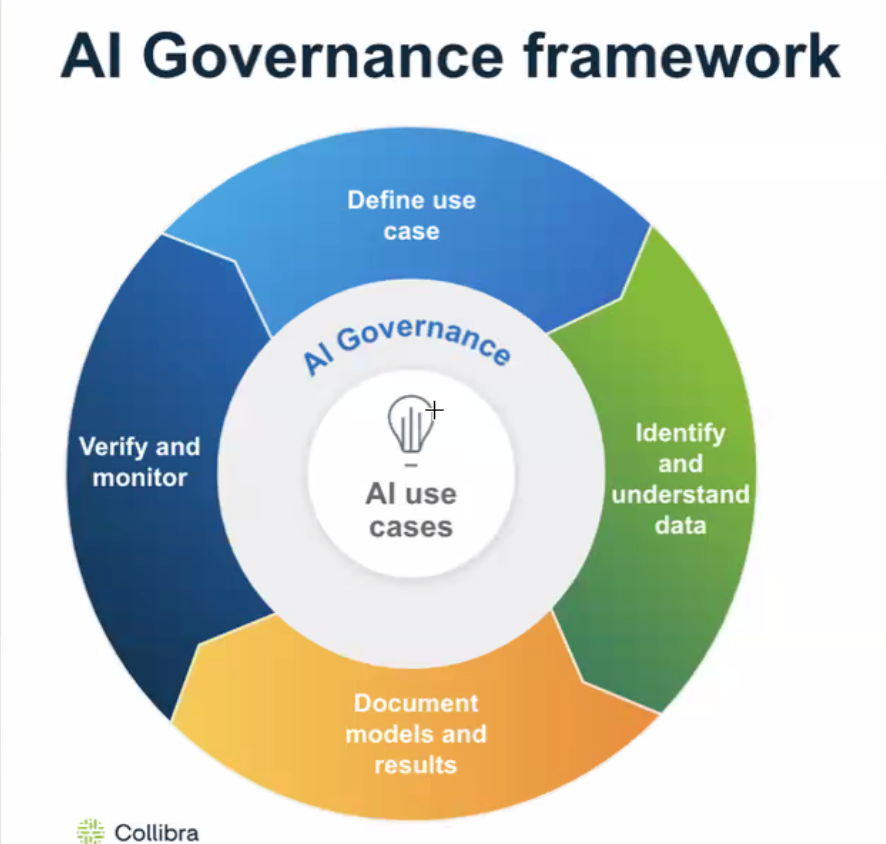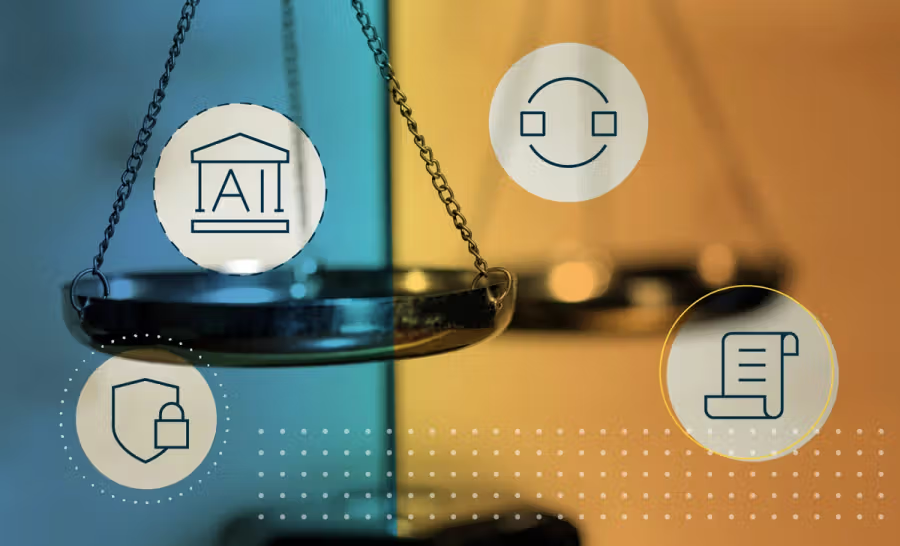Key AI governance principles for enterprises

Today, AI is reshaping industries with its unprecedented scale and transformative impact. At the heart of the AI revolution is the principle of ‘trusted data,’ a cornerstone for successful AI initiatives. Trusted data — characterized by its accuracy, reliability and integrity — is not just a requirement but a catalyst for transformative changes across organizations.
You can see the changes happening already. In the financial sector, AI is a game-changer, leveraging predictive analytics for market trends, risk assessment and customer service optimization. In customer service, the integration of AI, steered by the principle of trusted data, is transforming customer interactions, with AI-powered tools scaling and automating personalized engagements, marking a significant shift in the customer experience. For marketing teams, generative AI is revolutionizing how content of all types is produced — from written assets to visual graphics.
However, the integration of AI into data products — in other words, any product that uses data to achieve an operational or business goal — carries inherent risks, especially as AI efforts scale up. Effective AI governance, with a strong foundation in trusted data, is vital to harness AI’s potential for innovation and to ensure compliance with ethical standards, regulatory requirements and best practices.
Managing data effectively is a challenging yet crucial aspect of AI application development and management. The newest generative AI technologies, capable of creating human-like language, are only as effective as the data they are based on. If the data is flawed, the AI models trained on that flawed data will yield outputs that are seemingly impressive but fundamentally unsound.
The consequences of bad data can lead to significant implications for companies developing AI applications, including biased decision-making, inaccurate recommendations, and risks related to security, privacy, legality and organizational reputation.
To mitigate these risks and ensure trusted data, it’s important for organizations to embrace comprehensive AI governance practices.
Need trusted data for your AI initiatives? Explore our AI governance framework.
Principles of AI governance
- Transparency
Transparency is a cornerstone of AI data governance. There must be clear visibility into how AI algorithms work and what drives their decision-making processes. It's not acceptable for artificial intelligence systems to be a "black box" if they're being relied upon in environments where their decisions impact human beings. If an organization relies on AI to assist with decision-making, it must be able to explain how the algorithms arrive at their decisions. If models are being retrained regularly, their operations must also be reviewed regularly to ensure they're still properly understood.
2. Accountability
Organizations must consider the impact AI can have on their operations and any affected stakeholders, including staff, customers or others to whom they have a duty of care. They should set high standards for managing the impact of AI and maintaining a fair and safe environment. As with many other emerging technologies, AI is evolving rapidly and leaders must stay abreast of changes in technologies while considering how those changes may affect people who use their services.
3. Security
Internet-facing AI models are vulnerable to external attacks through traditional means and more innovative breaches, such as prompt engineering. Organizations utilizing AI in their daily operations must take security seriously to prevent data breaches and ensure the company's operations aren't compromised.
AI security compliance typically involves several precautions, including:
- Encryption with secure algorithms
- Technical safeguards on prompts and on the algorithm itself
- Choosing a model designed with compliance in mind
- Regular audits to ensure compliance
One often-overlooked area of security is incident response. It's crucial to have systems in place to respond to suspected data breaches to mitigate the damage and prevent future attacks.
4. Nondiscrimination
The use of AI for automated decision-making presents significant risks related to equality and nondiscrimination. For example, automated screening tools used during the hiring process may erroneously rule out individuals from certain minorities. This may also be the case with tools used to assess risk factors for loans or insurance or the provision of goods and services.
Public and private sector organizations must identify the risks AI presents in their organizations and ways to mitigate them through changing training data or putting manual safeguards in place. When done effectively, this can help build trust in the AI systems and improve their usefulness and performance.
5. Privacy
As AI becomes increasingly commonplace, privacy teams are increasingly more concerned about data privacy and how organizations use the data submitted by clients and customers. Some key risk areas include:
- How sensitive data is collected and used
- Collection of background data (e.g., device information, user habits)
- Whether data is shared with third parties
- Surveillance or other data collection without consent
- Use of data to train models
- Security risks, such as data exfiltration or breaches
Large organizations could have access to huge amounts of data relating to their users, including financial information, biometrics and browsing habits. Securing that data and giving users control over how it's used is essential from an ethical AI governance perspective.
6. Bias control
From voice recognition software that struggles to recognize regional accents because users from those regions weren't included in the training group, to hiring algorithms that exclude ethnic minorities because they're underrepresented in the field, there are many examples of biased algorithms.
Artificial intelligence models respond to the data they're given. If the training data is biased in any way, the resulting model also shows bias. One challenge faced by AI researchers is that they have unconscious biases. It's difficult to provide an AI model with a truly neutral set of training data if the human researchers don't realize a problem exists.
By regularly reviewing model performance and providing feedback or fresh training data, it's possible to gradually eliminate bias in your AI algorithms.
AI starts (and ends) with trusted data
You want to transform AI into value to fuel your business. But your AI models are only as good as the data they use.
At Collibra, our mission is to unite your entire organization with trusted data – including the data that trains your AI models – that’s easy to find, understand and access so you can do more with it.
To drive successful AI initiatives, comprehensive AI governance tools are a crucial cornerstone for organizations that want to initiate or enhance AI initiatives, turning them into operational and competitive strengths.
For AI and data leaders, our AI governance framework provides a practical, repeatable process that empowers your AI roadmap to drive substantial value.
Read our blog, AI governance: Why our tested framework is essential in an AI world.

Collibra AI Governance
As the demand for AI applications grows, the need for AI governance is becoming increasingly urgent.
At Collibra, we are excited to support organizations in achieving their AI objectives, drawing from our extensive experience in data management.
For AI and data professionals driving AI initiatives, Collibra Data Intelligence Platform can help your organization:
- Quickly find, understand, and trust data: With a well-structured data catalog and governance, users can easily locate the data they need, understand its context, and have confidence in its quality. This efficiency saves valuable time and resources. You can’t start training AI without the data — but with data intelligence, you can hit the ground running.
- Drive a common language: Data governance facilitates the creation of a common language around data within an organization. This shared understanding speeds up decision-making, promotes collaboration and fosters a data-driven culture.
- Leverage automation: By integrating data governance with automation tools, organizations can keep pace with the rapidly evolving AI landscape. Automated processes ensure consistent adherence to data standards, enable efficient data discovery and enhance data quality.
- Mobilize workforce collaboration: Data governance encourages collaboration among various stakeholders, including data professionals, business users and IT teams. By breaking down silos and promoting cross-functional collaboration, organizations can unlock the full potential of their data assets. Anyone who has ever managed to put AI into production knows it is an intense team sport.
- Ensure compliance and mitigate risks: Data governance helps organizations meet regulatory requirements, such as data privacy regulations (e.g., GDPR) and industry-specific standards. By implementing controls and monitoring mechanisms, organizations can mitigate risks associated with data breaches and non-compliance.
If you’re an AI-driven organization (or striving to be one), now is the time to implement AI governance as not only a risk-mitigating element of your efforts but as a catalyst for creating scalable AI with trusted data.
Looking to understand common AI governance terminologies better? Our AI Governance Glossary, expertly curated by Collibra’s data experts, serves as a crucial resource for anyone interested in or engaged with AI governance.
Explore Collibra AI Governance to understand how trusted data can transform your AI initiatives into sustainable success.
In this post:
Related articles

AIMay 21, 2024
Collibra wins prestigious 2024 Communicator Award for AI Governance campaign

AIJuly 15, 2024
How to observe data quality for better, more reliable AI

AINovember 13, 2023
AI ethics and governance: responsibly managing innovation

AI GovernanceFebruary 28, 2025
AI agents: Build or buy, governance remains critical
Keep up with the latest from Collibra
I would like to get updates about the latest Collibra content, events and more.
Thanks for signing up
You'll begin receiving educational materials and invitations to network with our community soon.
